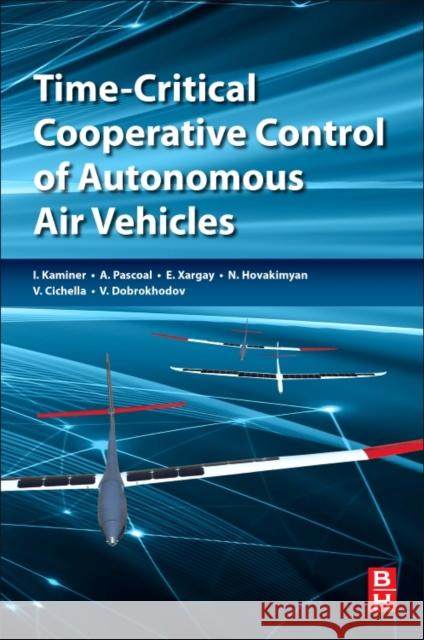Time-Critical Cooperative Control of Autonomous Air Vehicles » książka



Time-Critical Cooperative Control of Autonomous Air Vehicles
ISBN-13: 9780128099469 / Angielski / Miękka / 2017 / 270 str.
Time-Critical Cooperative Control of Autonomous Air Vehicles
ISBN-13: 9780128099469 / Angielski / Miękka / 2017 / 270 str.
(netto: 507,87 VAT: 5%)
Najniższa cena z 30 dni: 531,07
ok. 30 dni roboczych
Dostawa w 2026 r.
Darmowa dostawa!
Wydanie ilustrowane
Part One Time-Critical Cooperative Control: An Overview1. Introduction2. General Framework for Vehicle Cooperation
Part Two Cooperative Control of Fixed-Wing Air Vehicles3. 3D Path-Following Control of Fixed-Wing Air Vehicles4. Time Coordination of Fixed-Wing Air Vehicles5. Meeting Absolute Temporal Specifications6. Time Coordination Under Quantization7. Time Coordination Under Low Connectivity8. Flight Tests: Cooperative Road Search
Part Three Cooperative Control of Multirotor Air Vehicles9. 3D Path-Following Control of Multirotor Air Vehicles10. Time Coordination of Multirotor Air Vehicles11. Flight Tests of Multirotor UAVs
Part Four Final Considerations12. Summary and Concluding Remarks
AppendixA. Mathematical BackgroundB. Proofs and Derivations
He is member of the Institute of Electrical and Electronic Engineers, American Institute of Aeronautics and Astronautics and Panel Member of the NATO Research Technology Organization, SCI-023 on Unmanned Combat Air Vehicles. He won the NASA Certificate of Recognition for the Creative Development of a Technical Innovation, October 1991; the 1994 NATO Fellowship for Scientific and Technological Exchange, the 1994 Excellence in Research Award, Naval Postgraduate School, the 1995 ASEE/NASA Summer Faculty Fellowship, the 1995 NATO Fellowship for Scientific and Technological Exchange, the 1999 AIAA Outstanding Service Award, the 1999 NPS Menneken Annual Faculty Award for Excellence in Scientific Research. He graduated as an engineer at the DEE of IST and received the M.Sc. and PhD degrees by the Electrical Engineering in 1985 and by the Control Science Departments of the University of Minnesota, Minneapolis, MN, USA, respectively.
He has been editor of 2 books, 4 book chapters, 40 Journal and ca 200 conference articles, all in major rigoursly peer reviewed venues. He is a frequent invited and plenary speaker in major scientific meetings on control and robotics.
He has led dozens of major research projects in marine robotics funded by several EU programs, and other international programs (FCT, AdI) , among which the folllowing FREESUBNET, GREX, CO-3AUVs, FREESUB, VENUS, EXOCET/D, MAYASub, MAROV, SADOGEOROB, CARAVELA, ASIMOV, can be singled out.
He received his Ph.D. in Aerospace Engineering from the University of Illinois at Urbana-Champaign in 2013. Before that, he earned an M.S. in Control Engineering from the Technical University of Catalonia and an M.S. in Aerospace Engineering from the Politecnico di Torino, both in 2007. He has ten years of experience in the design, integration, and testing of flight control systems for aerospace applications. Main accomplishments include the development and evaluation of fault-tolerant flight control systems for (i) a full-scale, variable-stability Learjet aircraft in collaboration with the USAF Test Pilot School; and (ii) a subscale variable-stability transport aircraft with the NASA Langley Research Center. She received her MS degree in Theoretical Mechanics and Applied Mathematics in 1988 from Yerevan State University in Armenia. She got her Ph.D. in Physics and Mathematics in 1992, in Moscow, from the Institute of Applied Mathematics of Russian Academy of Sciences, majoring in optimal control and differential games. In 1997 she has been awarded a governmental postdoctoral scholarship to work in INRIA, France. In 1998 she was invited to the School of Aerospace Engineering of Georgia Tech, where she worked as a research faculty member until 2003. In 2003 she joined the Department of Aerospace and Ocean Engineering of Virginia Tech, and in 2008 she moved to University of Illinois at Urbana-Champaign, where she is a professor, university scholar and Schaller faculty scholar of Mechanical Science and Engineering. She has co-authored a book and more than 300 refereed publications. She is the recipient of the SICE International scholarship for the best paper of a young investigator in the VII ISDG Symposium (Japan, 1996), and also the 2011 recipient of AIAA Mechanics and Control of Flight award. In 2014 she was awarded the Humboldt prize for her lifetime achievements and was recognized as Hans Fischer senior fellow of Technical University of Munich. In 2015 she was recognized by Engineering Council award for Excellence in Advising. She is an associate fellow and life member of AIAA, a Senior Member of IEEE, and a member of SIAM, AMS and ISDG. Her research interests are in the theory of robust adaptive control and estimation, control in the presence of limited information, networks of autonomous systems, game theory and applications of those in safety-critical systems of aerospace, mechanical, electrical, petroleum and biomedical engineering. He received his bachelor and master degrees from University of Bologna, in Italy, respectively in 2007 and 2011. In 2010, he studied for 7 months in TUDelft, Holland, as an exchange student. In 2011 he worked for his master thesis in Naval Postgraduate School, Monterey, CA, where he stayed for 2 more years working as Research Assistant. He won the 2015 Ross Martin Award for Outstanding Research Achievement by a Graduate Student College of Engineering. UIUC, 2015; the National Science Fundation Student Travel Award Cyber-Physical Systems Week 2014. Berlin, Germany, April 2014, the National Science Fundation Student Travel Award, Early Career Professional Workshop on Exploring New Frontiers in Cyber-Physical Systems. Washington DC, March 2014 He won the US National Research Council Post-Doctoral Fellowship Award, 2001, 2002, 2003, and 2004, and the Mikojan Design Bureau Certificate of Recognition, 1999. He is a Senior Member of the American Institute of Aeronautics and Astronautics (AIAA) and member of the Institute of Electrical and Electronics Engineers (IEEE).1997-2025 DolnySlask.com Agencja Internetowa
KrainaKsiazek.PL - Księgarnia Internetowa









